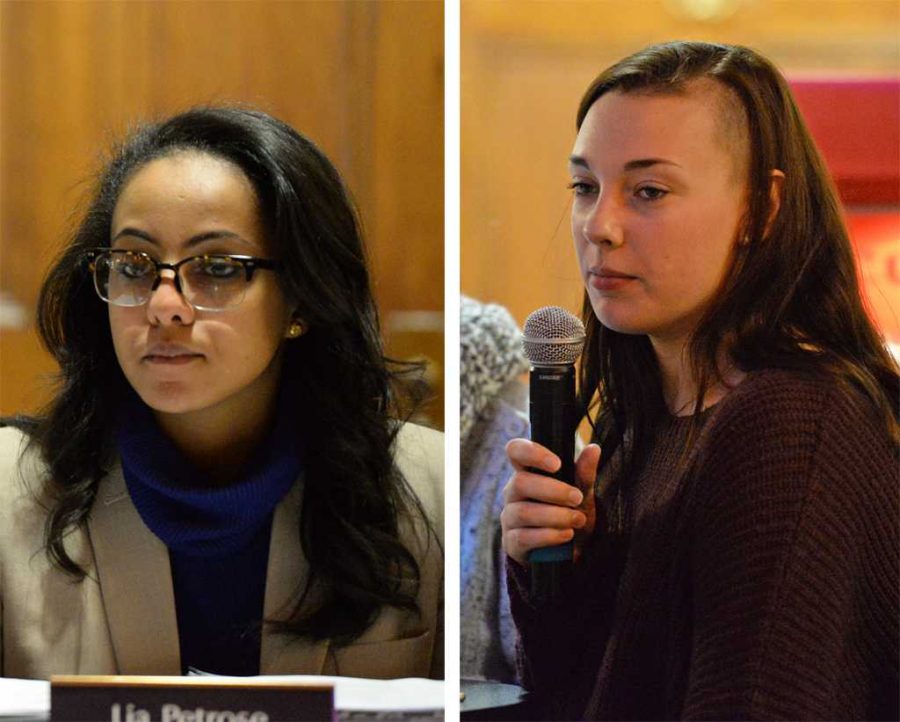Pitt Student Government Board has proposed new limits on the way it grants money to student researchers traveling to conferences.
Board Member Lia Petrose introduced a new bill at SGB’s public meeting Tuesday night to place a cap on the number of students the Board will send to a single conference with its Undergraduate Conference Fund. With the proposed rule, SGB will fund a maximum of three students to attend a single conference.
According to SGB President Nasreen Harun, the bill is supposed to promote fairness to students seeking research grants.
Under the current system, the Board accepts grant applications on a rolling basis and does not limit the number of students who can attend a single conference. Each semester, SGB sets aside $5,000 to fund at least 20 students traveling to conferences.
In theory, Harun said, 20 students could currently apply to go to the same conference, and the fund that semester “would be cleaned out,” meaning students going to conferences later in the semester will not have the same funding available.
“The idea is that we understand students don’t control the timing of their conference, so we are trying to find ways to allow students to get off-campus research presentation opportunities all throughout the year,” Harun said in an email Tuesday afternoon.
The fund, which SGB established last March, grants up to $250 to a student who wants to travel to a conference to present his or her research. Last semester, Harun said the fund was empty after a month because of multiple applications to the same conference or from students in the same department, so SGB “took it as a learning experience” and wanted to prevent the same situation this semester.
With Tuesday’s bill, the Board has proposed a three-student-per-conference cap, meaning the Board will spend a maximum of $750 on sending students to a single conference. The Board will accept applications based on a rolling, first-come-first-serve basis, as long as the first three meet eligibility requirements.
Only undergraduate students who are invited to present their research at a conference are eligible to apply. Upon approving a student for a grant, SGB then reimburses the student after the conference.
The Board will not change its restriction that students can only receive two travel grants during their time at Pitt.
Reena Naik, a senior economics major, said she agrees with the proposed rules.
“Many of the Urban Studies conferences tend to be later in the year,” Naik said. “[The changes] would be good for encouraging first-year students that are still figuring out details of their research.”
Naik has done research in the Urban Studies department on computer programming and using databases for tracking legal mechanisms.
Naik said she has not used the Undergraduate Research Fund because she was not aware of it when, as a sophomore, she attended her first conference, which she paid for with money from the Urban Studies department and her own fundraising.
”Getting the money to fund research can be really difficult,” Naik said.
In other action, the Board voted at its weekly planning session last Friday to pass proposed changes to the elections code.
According to Celia Millard, the Elections Committee chair, the biggest change with the bill is that a slate can now have four members instead of three. Millard said the committee also introduced 70 other changes as a result of unclear wording, such as in defining a flyer versus a poster.
“We wanted to make sure we were providing the people running for student government with a proper timeline, so we wanted to get [election] packets out today,” Harun said. “In order to do so, we needed to make sure we had finalized code to make it fair. We had to make people understand governing rules of campaigning.”
According to Harun, SGB typically puts the packets out two months before the SGB election day. The upcoming election is on March 1.
Harun said SGB will sometimes call a vote prior to the weekly public meeting if the issue is time-sensitive, like preparing for an election.
Harun said the election at the planning session was due to the timing of elections committee discussions and the short period of time between Thanksgiving and winter breaks this year.
“We put it under public circumstances,” she said.
In a press release on Friday, the Board invited anybody interested in attending the vote to SGB’s weekly planning session.
Millard, who introduced the changes to the elections code, said her committee is excited that SGB voted in favor of the elections code changes.
Although elections for new SGB positions are beginning, a spot on the Allocations Committee remains empty. Applications for a new Allocations Committee member are on SGB’s website. Nick Reslink, the Allocations chair, said the opening will be a good opportunity for people interested in a full term next year.
“This term is just semester, but the opening puts a good foot in the door,” he said. “It’s good for people looking to be a part of SGB.”
Reslink said he does not expect the Allocations Committee will select another alternate because it is “unlikely” that there will be another resignation this term.
“Now we are looking for people who can pick up policies and procedures quickly and people with technical knowledge about the allocations process,” Reslink said.
Allocations
The Interfraternity Council requested $542 for a guest speaker for the Panhellenic workshop. The Board approved the request in full.
Steel City Bhangra requested $3,367.14 for a competition in Philadelphia. The Board approved the request in full.


